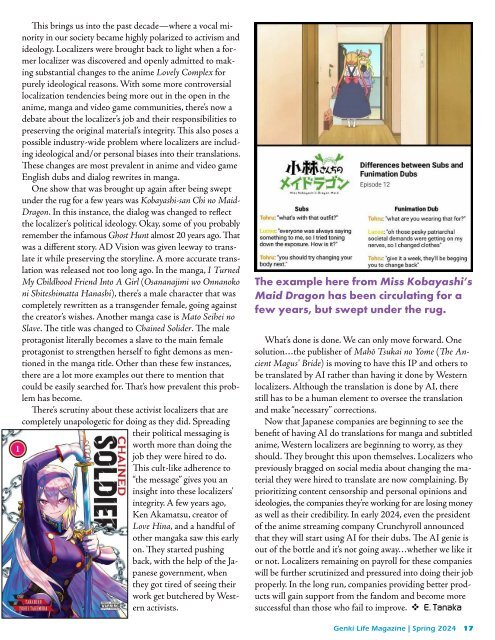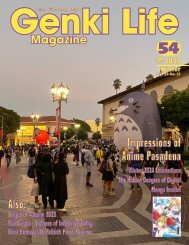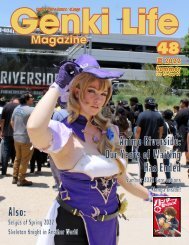Genki Life Magazine 55 - Spring 2024
How Can We Make This Stuff Right?: Western Localizers Prioritize Ideology Over Doing Their Job Isekai de Cheat Skill o Te ni Shita Ore wa, Genjitsu Sekai o mo Musō Suru: Level Up wa Jinsei o Kaeta An Interview with Cosplayer OCD_Usagi Wield VR OneStock PlayStation Game Gremlins Strike Again
How Can We Make This Stuff Right?: Western Localizers Prioritize Ideology Over Doing Their Job
Isekai de Cheat Skill o Te ni Shita Ore wa, Genjitsu Sekai o mo Musō Suru: Level Up wa Jinsei o Kaeta
An Interview with Cosplayer OCD_Usagi
Wield VR OneStock
PlayStation Game Gremlins Strike Again
You also want an ePaper? Increase the reach of your titles
YUMPU automatically turns print PDFs into web optimized ePapers that Google loves.
This brings us into the past decade—where a vocal minority<br />
in our society became highly polarized to activism and<br />
ideology. Localizers were brought back to light when a former<br />
localizer was discovered and openly admitted to making<br />
substantial changes to the anime Lovely Complex for<br />
purely ideological reasons. With some more controversial<br />
localization tendencies being more out in the open in the<br />
anime, manga and video game communities, there’s now a<br />
debate about the localizer’s job and their responsibilities to<br />
preserving the original material’s integrity. This also poses a<br />
possible industry-wide problem where localizers are including<br />
ideological and/or personal biases into their translations.<br />
These changes are most prevalent in anime and video game<br />
English dubs and dialog rewrites in manga.<br />
One show that was brought up again after being swept<br />
under the rug for a few years was Kobayashi-san Chi no Maid-<br />
Dragon. In this instance, the dialog was changed to reflect<br />
the localizer’s political ideology. Okay, some of you probably<br />
remember the infamous Ghost Hunt almost 20 years ago. That<br />
was a different story. AD Vision was given leeway to translate<br />
it while preserving the storyline. A more accurate translation<br />
was released not too long ago. In the manga, I Turned<br />
My Childhood Friend Into A Girl (Osananajimi wo Onnanoko<br />
ni Shiteshimatta Hanashi), there’s a male character that was<br />
completely rewritten as a transgender female, going against<br />
the creator’s wishes. Another manga case is Mato Seihei no<br />
Slave. The title was changed to Chained Solider. The male<br />
protagonist literally becomes a slave to the main female<br />
protagonist to strengthen herself to fight demons as mentioned<br />
in the manga title. Other than these few instances,<br />
there are a lot more examples out there to mention that<br />
could be easily searched for. That’s how prevalent this problem<br />
has become.<br />
There’s scrutiny about these activist localizers that are<br />
completely unapologetic for doing as they did. Spreading<br />
their political messaging is<br />
worth more than doing the<br />
job they were hired to do.<br />
This cult-like adherence to<br />
“the message” gives you an<br />
insight into these localizers’<br />
integrity. A few years ago,<br />
Ken Akamatsu, creator of<br />
Love Hina, and a handful of<br />
other mangaka saw this early<br />
on. They started pushing<br />
back, with the help of the Japanese<br />
government, when<br />
they got tired of seeing their<br />
work get butchered by Western<br />
activists.<br />
The example here from Miss Kobayashi’s<br />
Maid Dragon has been circulating for a<br />
few years, but swept under the rug.<br />
What’s done is done. We can only move forward. One<br />
solution…the publisher of Mahō Tsukai no Yome (The Ancient<br />
Magus’ Bride) is moving to have this IP and others to<br />
be translated by AI rather than having it done by Western<br />
localizers. Although the translation is done by AI, there<br />
still has to be a human element to oversee the translation<br />
and make “necessary” corrections.<br />
Now that Japanese companies are beginning to see the<br />
benefit of having AI do translations for manga and subtitled<br />
anime, Western localizers are beginning to worry, as they<br />
should. They brought this upon themselves. Localizers who<br />
previously bragged on social media about changing the material<br />
they were hired to translate are now complaining. By<br />
prioritizing content censorship and personal opinions and<br />
ideologies, the companies they’re working for are losing money<br />
as well as their credibility. In early <strong>2024</strong>, even the president<br />
of the anime streaming company Crunchyroll announced<br />
that they will start using AI for their dubs. The AI genie is<br />
out of the bottle and it’s not going away…whether we like it<br />
or not. Localizers remaining on payroll for these companies<br />
will be further scrutinized and pressured into doing their job<br />
properly. In the long run, companies providing better products<br />
will gain support from the fandom and become more<br />
successful than those who fail to improve. ❖<br />
<strong>Genki</strong> <strong>Life</strong> <strong>Magazine</strong> | <strong>Spring</strong> <strong>2024</strong> 17













